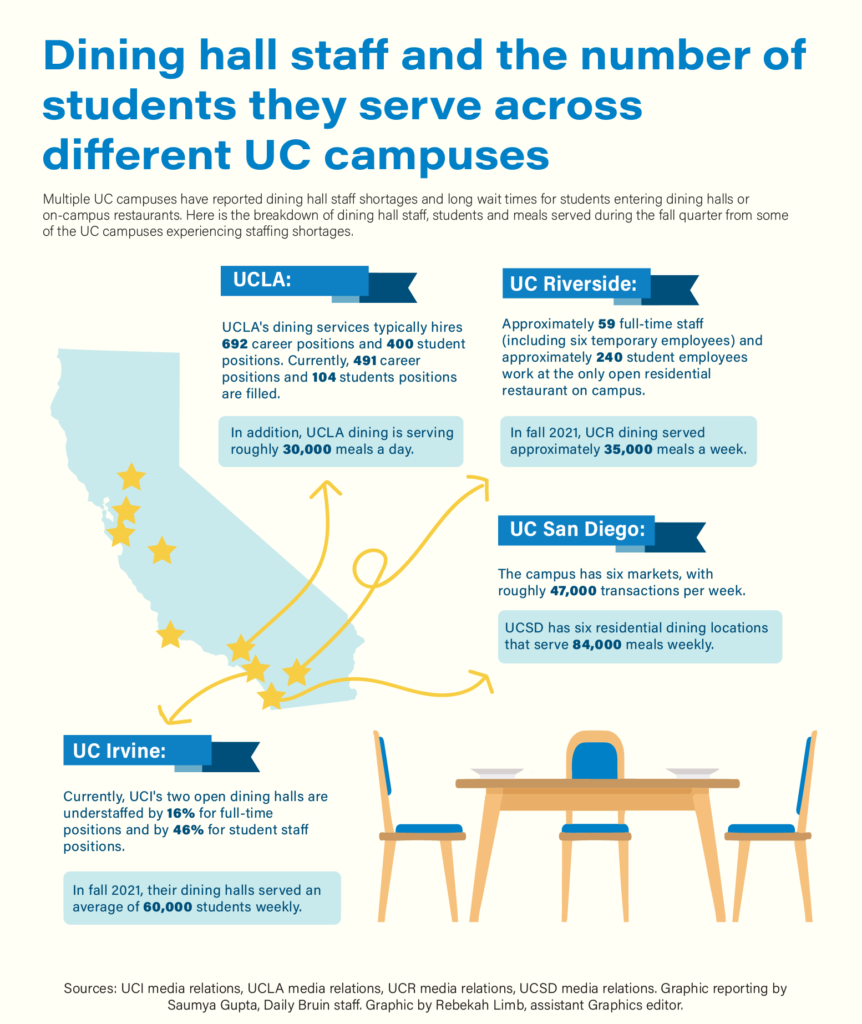Dining hall labor shortages lead to longer lines, low-quality food across UC

Dining halls across University of California campuses are employing fewer dining hall workers this quarter compared to previous years. (Photo by Noah Danesh/Daily Bruin. Photo Illustration by Katelyn Dang/Illustrations director)

By Saumya Gupta
Nov. 11, 2021 1:54 a.m.
Multiple University of California campuses are facing labor shortages in their dining halls, impacting employees’ and students’ on-campus dining experiences.
In September, the United States workforce was 5 million people fewer than before the COVID-19 pandemic because of a multitude of factors, including the risk of getting COVID-19, wanting to explore different job prospects, and child care issues, according to The New York Times.
UC campuses have felt the effects of this labor shortage.
Dining halls typically have 1,092 staff members, but currently, only 595 positions are filled, said UCLA spokesperson Katherine Alvarado in an emailed statement. Similarly, according to UC Irvine spokesperson Sheri Ledbetter, UC Irvine student positions are filled to 46% and full-time staff positions are filled to 84% of what they normally are. Additionally, UC Riverside typically employs 800 to 900 student workers but currently has about 240, said UC Riverside spokesperson John Warren in an emailed statement.
For fall, multiple UC campuses curtailed their operations to accommodate the labor shortage.
At UCLA, UC Merced, UC Irvine, UC Riverside and UC San Diego, not all dining hall locations are open, and menus are limited compared to the food options available pre-pandemic.
Cassandra Gatica, the Undergraduate Students Association Council internal vice president, said with the staff shortage, the current dining hall workers are overworked and underpaid. She added that workers need to be paid more appropriately for their increase in workload and need to be treated more fairly, for example, by getting proper breaks.
“They’re taking up more roles than usual because of the shortage, and oftentimes, that’s leaving them to be very much overworked and very tired,” said Gatica, a third-year sociology student.
Todd Stenhouse, a spokesperson for American Federation of State, County and Municipal Employees Local 3299, a union that represents more than 27,000 service, patient care and skilled craft workers at the UC, said it recently reached out to the University for a meeting to talk about the staffing shortages but has yet to hear back from the UC.
He added that with regard to hiring, UC workers deserve to work for the University without barriers preventing them from doing so.
People who originally worked as contract workers with the UC face language barriers, issues with applications and travel costs to attend interviews when they apply to work directly with the University, he said.
“The University of California should be making it easier to fill these positions to qualified applicants … not harder,” Stenhouse said.
He said if the University is willing to work with AFSCME Local 3299, then it will be able to find people to help reduce the staffing shortage. Stenhouse added that the UC agreed to strict limits on outsourcing in its contract with AFSCME Local 3299, and if the UC decides to outsource jobs, then the union will oppose them.
“There’s a lot UC can do to make itself more competitive in the labor marketplace here, and … we are happy to help them in that process, but they have to be willing to work with us,” Stenhouse said.
Several students across different UC campuses have expressed dissatisfaction with the wait times caused by the labor shortage.
[Related: Students face long lines, wait times at dining halls amid staffing shortage]
Kiana Beheshtian, a third-year public health student at UC Merced, said the lines for food are so long that she has sometimes had to skip meals or opt for a quick snack. Similarly, during the beginning of the quarter at UC San Diego, lines would be up to an hour long, said Manu Agni, president of the Associated Students of UC San Diego.
USAC President Breeze Velazquez said she has heard the wait for food at UCLA can be an hour or more.
“If students are paying to live on the Hill, and they want that experience of having that food available, they should be able to have it and vice versa,” added Velazquez, a fourth-year Chicana and Chicano studies and public affairs student. “Student workers and workers who are hired, they should also be given those rights where they are able to take their 15 minutes and be able to relax and not have that constant stress of moving around nonstop.”
In addition to long wait times, some students have noticed a decline in the quality of food.
Earlier this quarter, UCLA students expressed issues with the dining hall food, such as receiving raw chicken and mislabeled items.
[Related: Students question food safety practices at UCLA dining halls]
At UC Merced, Beheshtian said she has noticed a decrease in food quality. She said food has been undercooked, and she has found things in her food that should not be there.
“I feel like it’s gotten worse, (where) a lot of the people I know have gotten sick from there,” she added.
To combat the staffing shortages, universities should try to employ more students, said Gehad Elhanafy, Associated Students of UC Merced internal vice president.
“I’m pretty sure almost every student has a job to be able to support themselves, so why not pay them to work where they go to school?” said Elhanafy, a third-year bioengineering student at UC Merced. “Why have them drive all the way to the McDonald’s across town because they need a job or to the malls … or to that one restaurant somewhere far away … versus just employing them on campus?”
Some UC campuses have tried a variety of ways to incentivize people to apply.
UCLA has been attending job fairs and using other recruitment and outreach efforts to help fill the vacancies, Alvarado said in the emailed statement.
“UCLA Dining will continue to work on solutions until UCLA’s 14,500 on-campus residents are able to enjoy the same level of quality and service that was provided before the pandemic and earned UCLA recognition as having the best dining program in American higher ed,” she added.
UC Riverside has been participating in job fairs, billboard advertising and other recruitment strategies, Warren said in an emailed statement.
UC San Diego has been able to hire more employees who help reduce the issues caused by the lack of staff, said UC San Diego spokesperson Leslie Sepuka in an emailed statement.
“The university has hired and onboarded several full-time dining staff members and dining student employees, and we hope to see a similar trend for the upcoming weeks,” Sepuka said.
Over the course of the quarter, the lines at UC San Diego dining halls have decreased significantly from the hour wait, Agni said.
“When we started the quarter, things were bad in both dining halls, restaurants and across campus at transportation, the student union, etc.,” Agni said. “Now, things are still bad, but they’re getting better. I know that, for example, in addition to dining halls, transportation is also short on staff, but they’re making up for that with different service offerings and aggressive recruitment bonuses, pay increases.”
Velazquez added that she has noticed an improvement in her on-campus job when more student workers were hired, but these improvements have not been extended to dining halls on the Hill.
In her own office, Gatica said she’s heard the lines have gotten better at eat-in dining halls but not at takeout places such as The Study at Hedrick and Rendezvous.
She added that even though there is a slight improvement, the university needs to compensate employees better with livable wages.
“I do hope UCLA takes accountability for this and also supports their workers (and) supports the labor that’s being put into to serve our students with food,” Gatica said.


